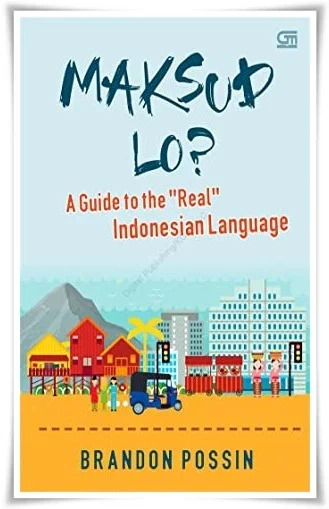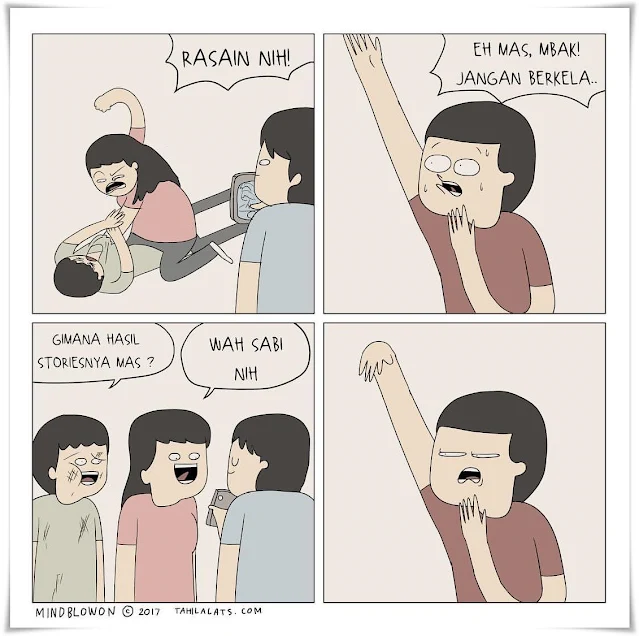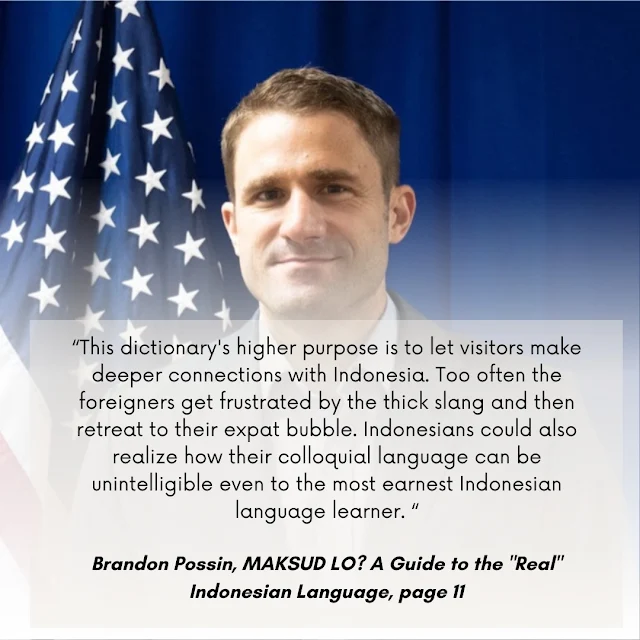Book title: Maksud Lo? A Guide to the "Real" Indonesian Language (Paperback)
Author: Brandon Possin
Pages: 78 Pages
Language: English Language
Published Date: July 6th, 2020
Publisher: Gramedia Pustaka Utama
Price: IDR 65,000 on the Gramedia website and $19.95 on Amazon.Format: PDF Format
 |
Book Front cover of Maksud Lo? A Guide to the "Real" Indonesian Language |
Maksud LO? is an Indonesian slang dictionary book used by Indonesians today and written by Brandon Possin.
Brandon Possin wrote MAKSUD LO? in simple words which are easy to understand even for those less proficient in English.
The flow of writing is clear, presenting the alphabetized Indonesian Slang vocabulary. The book also has slang vocabulary from cities like Jakarta, Bandung, Surabaya, Makassar, Yogyakarta, and Cilacap.
The book MAKSUD LO? is perfect for those who want to visit Indonesia and is suitable for all ages.
About the author Brandon Possin
 |
Brandon Possin, credit pic by his LinkedIn account |
Brandon Possin has 14 years of experience as an American diplomat and was an American diplomat serving as Political/Economic Section Chief at the U.S. Consulate General in Surabaya, Indonesia, from 2014 – 2016. Brandon Possin currently serves at the U.S. Embassy in Tokyo, Japan.
Previously, he managed U.S. economic policy with Pakistan at the State Department’s headquarters. He has served as an Economic Officer at U.S. Embassy in Islamabad (Pakistan), as Economic Officer at the U.S. Embassy in Lima (Peru), as Consular Officer/Ambassador Aide at the U.S. Embassy in Jakarta, and at the U.S. Embassy in Buenos Aires (Argentina). He joined the Foreign Service in 2007 after a career as a journalist and business consultant.
Brandon Possin experienced such warm hospitality during his five years living in Indonesia that he was inspired to write this book. This book proves how much he cherishes Indonesia and wants to help expats in Indonesia to better understand Indonesian slang.
Brandon Possin is a native of Madison, Wisconsin, and graduated from the University of Virginia. was a visiting student at universities in Chile and Brazil. He speaks Portuguese, Indonesian, Spanish, Japanese, and basic Urdu.
Brandon Possin's Purpose in Writing The Book “MAKSUD LO?”
According to the 1990 Indonesian Population Census, only 15 percent of the population used formal Indonesian as an everyday language. However, 75% of the Indonesian residents use slang words in everyday life.
It's true! One example? Me!
I use Indonesian slang more than the formal Indonesian language in my everyday life. I only use formal Indonesian in formal situations, such as attending seminars or symposiums.
My habit of using slang on the daily fits with what Brandon Possin writes about the everyday Indonesian language on page 13 :
"Slang Indonesian is the real Indonesian. It is the language one will hear in business meetings, at cafes, on the street, and in-text message conversations."
Possin writes about how slang Indonesian can be confusing for foreigners. For example, the sentence "Kok gitu sih?" is often used in daily parlance whereas the official textbooks teach, "Mengapa anda merasa seperti itu?" – to ask why someone feels a certain way (page 15).
As such, I’d much prefer foreigners to learn both, but with more emphasis on understanding Indonesian slang. My opinion fits with Brandon Possin's purpose in writing this book.
This dictionary aims to let visitors make deeper connections with Indonesia. Too often, foreigners get frustrated by the thick slang and then retreat to their expat bubble.
An Introduction To Indonesian Slang
As an Indonesian, I've learned slang Indonesian since I was a teenager in the '90s. Much of my generation learned slang from local celebrities like Debby Sahertian, who invented Indonesian words like akika, the pronoun for “me.” On point, Possin includes akika and other words like BEGINDANG (synonym of BEGITU in Bahasa, which means thereby) and also the word BELENJONG (synonym to BELANJA in Bahasa) which means shopping.
As Possin writes on page 17, slang is ever-changing – and Indonesian slang continues to change depending on who introduces words and popularizes it amongst speakers.
For example, as far as I know, the Indonesian slang word SABI (which means can) is taken from the vocabulary BISA and then read backward into SABI, introduced by the popular TAHILALATS comic by Nurfadli Mursyid in 2017.
 |
Tahilalat’s Komik, which introduces the words SABI (Credit to Instagram account @tahilalats ) |
It was amazing to read this book and realize just how broadly the Indonesian slang lexicon has evolved. Take “CCP” for example – meaning ”secretly”, which is derived from “curi-curi pandang” which means stealing glances (page 34).
If not for Maksud Lo, I would never have known the etymology of Indonesian slang. Like Possin writes (on page 20):
"... journeying through the Indonesian slang etymology is a trip into the eclectic, multicultural past. Slang reflects cultural fusion with English-speaking cultural norms. "
Survival Guide to Slang Indonesian
In his book, Brandon Possin wrote about how Indonesian slang develops through five areas: .
1. Acronyms
As an Indonesian, I love using acronyms for efficiency and for fun. For example, I often use the acronym TTDJ (read: titidije) to say “hati-hati di jalan”, which means have a safe drive. I also often use the acronym BT (read be-te) from the English sentence bad-tempered to say I'm in a bad mood. In a text message conversation, I often use the acronym GPP (it's okay) from gak -apa-apa (tidak apa-apa).
Brandon Possin gives some of the slang Indonesian acronyms in the book on page 22, such as Percaya diri (confidence) into PD or pede. In fact, the use of acronyms in Indonesia is commonly used by the Indonesian people, the government, and institutions. For example, BKKBN stands for Badan Kependudukan dan Keluarga Berencana Nasional” (National Population and Family Planning Board), and MPR stands for Majelis Perwakilan Rakyat (People's Consultative Assembly).
2. Contractions
Slang Indonesian often comprises two or more words which can be contracted down to the first few letters of each word. An example is the slang “makasih”, which is derived from “terima kasih”, which means thank you (page 21).
3. Short Style
As an Indonesian, I often use shortened words and sentences with natural soundsFor example, on page 23, Possin shares that, instead of saying "Mengapa anda menatap?" one can choose instead to say "ngapain sih liat-liat?" FYI, NGAPAIN is slang Indonesian from the word MENGAPA (why) which takes only the end of the words such as “-NGAPA” which is added to the ending “-ING”, forming NGAPAIN. Similarly, the word LIAT is taken from formal Indonesian LIHAT (see), which erases the alphabets H and says it doubles into liat-liat.
LIAT is an adjective that has a meaning in formal Indonesian – weak (not stiff) but not easily broken. Thus the sentence “ngapain lihat-lihat sih?” sounds more natural, easy and relaxing to use as opposed to "Mengapa anda menatap". I feel uncomfortable using formal Indonesian as an everyday language because it sounds too stiff and serious.
4. Verbs
Slang Indonesian changed the formal Indonesian basic into something that sounds more natural.For example,on page 24, Possin writes that “Melihat” (to see) becomes liat (explanation as above). Mengerti (to understand) becomes NGERTI (Omitting “ME” and only using NGERTI). Bertemu (to meet) becomes Ketemu (KETEMU). There are other examples on page 26 about omitting the proper verbs prefix and adding "nge-", "ke-", e; eliminating one or few words and turning two vowels into one.
5. Adjectives and Nouns
Not only does it omit the prefix of the formal verb, but slang Indonesian can also omit prefixes of adjectives and nouns, eliminate one or a few letters of the word, replacing the letter "a" with "e," or turning two vowels into one.
For example, on page 26, Habis (depleted/finished) can turn into ABIS. Belum (not yet) into BLOM. The slang in Indonesia is also fun as you can add particles at the end of sentences, such as "Kok", "Sih", "Lah", "dong", "ah", "loh", and "deh" for sentences that express a feeling or statement to convince someone. Example: "Gak gitu dong!" (it's not like that!) to express feelings of self-defense.
All those Indonesian slang forms change formal Indonesian to sound more relaxed and comfortable. A lot more examples are given in the book.
MAKSUD LO?: Quick Impressions
As Possin writes on page 17: “For Indonesian native speakers, this guide could just help them become more self-aware of the language they speak and thus not confuse their foreign friends or colleagues. Countless times an Indonesian cannot separate the colloquial/slang vocabulary from formal vocabulary within his/her lexicon.”
Admittedly, sometimes, many Indonesians (including me) may need help to distinguish between standard Indonesian language and slang Indonesian words – which can be especially helpful for those who’d want to write a proper article or even a scientific paper..
Maksud Lo can thus help Indonesian citizens to be more aware and distinguish between standard language and slang.
Interestingly, formal Indonesian and regional languages have vocabularies adapted to how to speak politely and ethically according to age level.
For example, in the Sundanese region in the province of West Java, there are language levels that differ according to the purpose of use and to whom the person speaks to For example, Sundanese people have nine words to describe the act of eating! They are: :
- Dahar: which means eating when used for ourselves and to friends whom we are are close or familiar with
- Emam: Emam is a baby talk word used with children
- Tuang: Tuang is subtly used when talking to or referring to older or respected people. For example, "Dupi Bapak tos tuang?" which means, “Have you eaten?” The word Tuang itself in Indonesian means to pour or spill, however
- Neda: Neda is used when referring to ourselves eating
- Nyatu: Nyatu is used in a rough or harsh manner, such as when in a state of anger, or when referring to animals eating
- Barang Hakan: It means to eat greedily.
- Ngagares: Ngagares is used to express eating endlessly.
- Lebok: Lebok is considered a rough or uncouth word, and is usually used between very close friends.
- Lolodok: Lolodok is considered harsh language and also commonly used among close friends.
Unlike the English language, which uses the words Eat, Ate, Eaten, and Eating, distinguished based on when they are used, not to whom they are used and under what conditions.
In Indonesian, the word makan (eat) is the same in any situation and addressed to anyone. The only difference is that we need to add time information—for example, makan siang (lunch), makan pagi (breakfast), makan malam (dinner), and cemilan (snack).
Anyway, this book does not discuss Sundanese slang. It is just an example, LOL.
Conclusion
I am very grateful that Brandon Possin made a dictionary about Indonesian slang because it benefits Indonesian Visitors and local Indonesian citizens.
Visitors to Indonesia will find Maksud Lo very helpful in understanding the language used by Indonesian locals. As a bonus, Indonesians also learn about the slang currently being used, even me, who is unfamiliar with some slang used virally.
As Brandon Possin said on page 17:
"To be sure, slang is ever-changing, and the words in this guide might already be outdated. Yet many of these words do persist, even if the hippest of the hipsters in Seminyak aren't saying them now. They stay in movies and in literature and deserve a place in a printed book for once. It's worth taking a snapshot of Indonesian vocabulary for all to learn from and enjoy! This book might be as fun for locals as it is for visitors."
And yes, it's so true. Slang language often changes according to who is using it and the extent to which the vocabulary goes viral and is eventually used by all Indonesians daily."
I am also excited about this book because ten percent of proceeds will go to the BASABali charity for Orangutan Foundation International, a nonprofit U.S.-Indonesian organization dedicated to conserving wild orangutans and their rainforest habitat in Kalimantan. Awesome!!
Those interested in getting a copy of "Maksud Lo" A Guide to the Real Indonesian Language, can purchase the e-book at Gramedia’s website or also on Amazon.
 |
| Brandon Possin's quote |











wahh tamparan keras nih, ada orang luar yang buat buku tentang Bahasa Slang-nya Bahasa Indonesia.
BalasHapusI often use several Slang Acronyms too Mba.
For example : Gpp, Gpt (lagi ngapai tu?), sbb (sorry baru bales), etc
Haha. Iya nih saya juga ngaku salah satunya yg sering pakai bahasa slang nya bahasa Indonesia. Malah kaku kalau pakai bahasa resmi kecuali kalau di sekolah, atau pas ada seminar dan sejenisnya
HapusKern euy mas Brandon Possin, bahasa gaul anak muda Indonesia bisa jadi karya yang jadi panduan lain bule lain untuk memahami bahasa slank Indonesia.
BalasHapusbener mbak. aku juga salut sama orang luar yang tertarik untuk belajar bahasa slang Indonesia. kalo ada orang luar yang ngehabas gini, bakalan lebih menarik buat orang luar lainnya belajar bahasa slang indonesia hihi
HapusBetul nih mba, bisa lebih mudah juga bagi ortu seperti saya untuk nantinya memahami perkembangan bahasa mereka
Hapuswaw, jadi si bapak Brandon ini diplomat yang nulis buku ini ya? keren juga. anw, bahasa slang ini emang sih lebih cepat merasuknya ke kehidupan sehari2. aku ketularan adekku yang masih sd bahasanya aneh2 hha
BalasHapusIya nih, bahasa slang sekarang emang aneh-aneh. Dan anak-anak malah pada update.
HapusKuy, Sabi, ngab, dan bahasa slang lainnya ternyata menarik perhatian banyak orang termasuk Pak Brandon yak hehe. Sehingga kala WNA ke Indonesia bisa nih ceki² bahasa slang di kita itu apa aja ya
BalasHapusWow. I am so amaze that a diplomat of U.S. wrote a dictionary book who shared Indonesian slang. It will helped so many foreigner who wanna stay in Indonesia to have a good interaction with our local.
BalasHapusI definitely agree that this book so amazing. Then, this book isn't only good for foreigner but also for us as Indonesian, we have to read this book
Hapusmenark kayanya nih buku, jadi penasaran pengen baca lengkapnya :) diplomat of U.S. lho yang nulis hehe
BalasHapusIt's fun to see a foreigner's POV of our slang! Hahaha I hope this kind of book can attract much of people that curious about our culture, especially our pop culture in the future!
BalasHapusWkwkwk....as Sundanese I am glad Basa Sunda as an example
BalasHapusDahar, emam, tuang, lebih, nyatu, etc. See how rich we are...
And same as ke, i use Indonesian slang more than the formal Indonesian language in my everyday life. I only use formal Indonesian in formal situations, such as attending school
wahahhaha, Mas Brandon ini, lama jadi diplomat, jadinya banyak terpapar kata-kata bahasa Indonesia, dan bahasa daerah2 juga yaa, bagus lah yaa sekalian promoin bahasa Indonesia nih :))
BalasHapusUdah gitu jadi bikin penasaran deh, sudut pandang apa ya yang bikin beliau ini gercep ngejalanin riset buat menghadirkan buku soal bahasa gaulnya Indonesia. Pasti seru nih proses penulisan di balik bukunya.
HapusInteresting book with a foreigner as a writer. We could saw a foreigner perseption for our language. Suitable for a foreigner to learn Indonesian informal language easily.
BalasHapusIkutan bangga sih, ada yang bisa nulis buku bahasa Slang versi Indonesia. Jadi penasaran mau baca bukunya, Mbak :D
BalasHapusidem kak,
Hapussoalnya bahasa slang kita terbilang banyak juga ya hehe, biar sekalian dapat kosakata juga
Keren kang Brandon Possin, jadi penasaran sama bukunya.
BalasHapusCk ke gramedia dulu ah, biasanya ada sampul yang boleh dibaca.
Aku juga dah beli di Gramedia Online. Memang ini rekomendasi banget sih buat dibac. Banyak hal seru dan pengalaman penulis yang unik
BalasHapusBukunya Brandon Possin ini oke juga ya, jadi penasaran pengen baca juga bukunya. Lumayan buat menambah wawasan mengenai bahasa slang Indonesia gitu..
BalasHapusWah ternyata yang nulis orang luar, kupikir karyanya orang Indonesia. Hehehe .. bahasa slang Indonesia memang ada-ada aja. Siapa tahu loh nanti HOROK juga dibukukan #ehhh 😊
BalasHapusWow awesome orang luar negeri alias bule nulis tentang bahasa gaul Indonesia, kita masih niat-niat aja nulis ini itu
BalasHapusThe Book is so inspiring. As Indonesian I appreciate him. Really want to know the whole content of the book.
BalasHapusWaah kereen buku brandon ini jadi penasaran pengen membacanya, kereen euyy (gusti yeni)
BalasHapusWow, so inspiring. Bahkan saya banyak yahg nggak ngerti aslinya sama bahasa slang zaman now
BalasHapusJustru yang bikin kamus slang bahasa indi ya orang bule ya..karena mereka butuh banget sih ya.. sama ky kita kalo ke luar negeri juga kudu belajar bahasa slang nya..
BalasHapusWah ini buku karangan orang bule ya
BalasHapusBisa ya dia nulis buku tentang bahasa slang di Indonesia gini
Keren
Menarik nih bukunya...Jd penasaran pengin baca bukunya karena penulisnya justru dari orang luar. Buat orang luar yg pengin belajar bahasa Indonesia slang kyknya jg wajib pny nih buku.
BalasHapusI am very pleased with the praise for the wealth of languages owned in Indonesia by the author. Hopefully Indonesia and its unique culture, languages and as well as ethnicity can continue to inspire goodness throughout the world.
BalasHapusSo amazed with sundanese words how to describe 'eat' with so many words and different meaning, something like jajablog and lolodok, lol
BalasHapusPenulisnya jeli banget soal market yg mau membaca buku ini. Terutama org asing yg ingin berlibur/berbisnis dgn orang Indonesia. Cara berbaur dgn baik kpd masyarakat lokal ya hrs memakai bahasa lokal setempat, termasuk memakai bahasa slang.
BalasHapusSaya baru tahu ada buku ini. Dan penulisnya memang jeli, bisa menangkap ide bagus, tapi memang perlu dan bermanfaat. Jadi orang luar yang datang ke Indonesia, jadi paham ada bahasa-bahasa lokal, termasuk bahasa slang.
BalasHapusMenarik nih, buku slang Bahasa Indonesia tapi yang nulis mas mas Ngamerika. Kayanya bukan cuma orang luar yang lagi belajar bahasa Indonesia aja yang butuh tapi juga emak emak, biar bisa memahami percakapan kids zaman now...
BalasHapusJadi malu sama diri sendiri. Kita orang Indonesia kok gak kepikiran bikin buku tentang bahasa keseharian kita. Malah orang luar yang bikin dan lebih paham. Hiks
BalasHapusaduh seru ya ternyata bahasa slang indonesia, saya sendiri jarang banget pake bahasa slang kurang gaul hehe
BalasHapusIt's true, Indonesia has many slang word that (maybe) not easy to learn or sometime make them confuse. And as Indonesian, I often use the slang word for my daily conversation, definitely I just use these word only in informal situation. And when foreigners talking about this, it will be something unique
BalasHapusindonesia memang punya bnayak bahasa slang. nggak cuma itu, kadang bahasa daerah aja ada juga bermacam2 maksud dan arti pada kata2 tertentu ya kak
BalasHapusBuku ini menjadi motivasi bagi kita untuk bisa menggunakan bahasa Indonesia yang baik dan benar sesuai dengan yang sudah di standarkan. Namun, buku ini juga memberikan kita gambaran betapa kayanya Indonesia akan bahasa.
BalasHapusSuper keren nih penulisnya. Diplomat AS bikin buku tentang bahasa Indonesia dan bahasa gaulnya. Ini bisa jadi panduan buat kita semua, buat yang mau mendalami bahasa Indonesia.
BalasHapusKeren bnget ini. Orang asing malah belajar tentang Indonesia apalagi tentang bahasa gaulnya. Lah saya yang indonesia tulen saja kayaknya slang nya malah seuprit banget
BalasHapusLucuu juga yaa ulasan brandon tentang bahasa2 gaul atau alay di indonesia, kereen smg bukunya larid manis di negara orang (gusti yeni)
BalasHapuskeren banget sih orang bule bikin buku tentang bahasa slang kita. hihi. kalau dilihat bahasa slang ini juga selalu berkembang sesuai jamannya ya kayak sekarang gen Z bahasa slangnya pasti beda dengan generasi 90an
BalasHapusWah, keren sekali bikin kamus bahasa slang yang sering digunakan di Indonesia. Dulu setauku ada juga salah satu artis yang bikin kamus bahasa gaul (lupa namanya), hehe...
BalasHapusAku selalu penasaran dengan buku yang ditulis oleh WNA mengenai budaya, bahasa dan kebiasaan yang tanpa kita sadari, kita lakukan setiap hari. Memang seru sih, berbahasa itu. Tapi tentunya tetap berhati-hati dalam berkomunikasi agar silturahm dan hubungan baik tetap terjaga.
BalasHapusbuku yang menarik nih kayanya, mau beli ah cb cari di toko buku terdekat. Sudah lama juga nih gak baca buku soalnya
BalasHapusBrandon Possin wrote MAKSUD LO?
BalasHapusvisit Tel-U